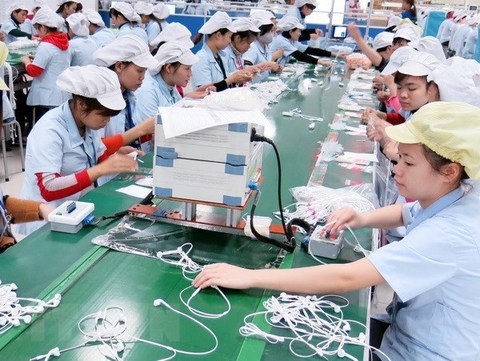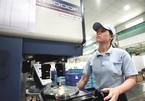 |
|
Workers on production line of headsets for smartphones of South Korean-invested Glonics Vietnam Co Ltd. Experts warn rising risk of domestic companies being acquired by foreigners amid COVID-19 pandemic.
|
At Prime Minister Nguyen Xuan Phuc’s meeting with businesses this month, Minister of Planning and Investment (MPI) Nguyen Chi Dung mentioned the risk that domestic firms could be acquired at cheap prices after the pandemic.
Data from the ministry’s Foreign Investment Agency showed the number of newly-registered foreign direct investment (FDI) projects in the first four months decreased 10 per cent against 2019’s same period to 984, but deals in the forms of share purchase and capital contribution increased 33 per cent to 3,210.
More than 2,600 equity acquisitions took place without increasing the charter capital of companies worth US$1.6 billion while only 580 transactions contributing $0.9 billion to domestic companies were recorded.
Japan, South Korean and China were the most active investors with deals from them increasing 40 per cent year-on-year, of which Japan ranked first with $743 million, followed by South Korea at $365 million.
Foreign investors are eyeing processing and manufacturing industries with 822 deals worth more than $1 billion, wholesale and retail, automobile and motorbike repair services with more than 1,000 deals worth $500 million.
Dung said difficulties caused by supply disruptions could not be overcome soon and would continue impacting many businesses and drive up M&A transactions, posing risks that businesses could be bought at low prices.
The Viet Nam Chamber of Commerce and Industry (VCCI) has recently proposed the PM temporarily suspend merger and acquisition (M&A) deals during the pandemic to limit foreign takeovers of Vietnamese enterprises.
Do Nhat Hoang, head of the MPI's Foreign Investment Agency, said the ministry has reported to the Government on the situation and solutions countries are applying to support domestic enterprises. However, according to him, Viet Nam should only limit the takeover of key businesses while still allowing investment activities in ordinary companies.
"We are currently working with ministries and agencies to prepare specific measures to limit takeover risks and advise the Government on this issue," Hoang was quoted on haiquanonline.com.vn.
Many governments have warned of the risk of businesses being acquired through M&A deals. Some have made moves to limit foreigners’ efforts to buy their domestic companies amid the pandemic.
Last week, Japan introduced new rules restricting foreign investment, forcing foreign investors to report in advance when they plan to buy a more than 1 per cent stake in more than half of the listed companies in the country (the previous threshold was 10 per cent).
In April, India tightened its policy on FDI that requires investment from neighbouring countries to go a government approval process.
Similar to India, Australia and Germany have recently stipulated that during the COVID-19 pandemic, all foreign investment must be considered by the governments to prevent “opportunistic takeovers”.
According to economist Nguyen Tri Hieu, this is the time when “shark” investors hunt for small enterprises at low prices. He has suggested the Government build policies and plans to attract foreign investment but should also tighten control over areas that may pose political and socio-economic risks.
The selection of industries calling for investment must also go along with setting the limit of foreign ownership at a reasonable rate which may be adjusted in accordance with supply and demand of the market, he said. — VNS

When Apple comes to Vietnam and FDI flow starts moving
Apple is making clearer signals in the production of components and products in Vietnam, opening up opportunities for Vietnam to participate more deeply in the global value chain.

Where will FDI head after leaving China?
Foreign investors are considering relocating their production bases out of China, and many of them are heading for Vietnam.
 Vietnamese businesses reeling under financial stress due to the COVID-19 pandemic have become vulnerable to foreign takeovers and need the Government's support, according to experts.
Vietnamese businesses reeling under financial stress due to the COVID-19 pandemic have become vulnerable to foreign takeovers and need the Government's support, according to experts.